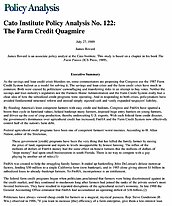As the savings and loan credit crisis blunders on, some commentators are proposing that Congress use the 1987 Farm Credit System bailout as a model for solving it. The savings and loan crisis and the farm credit crisis have much in common: Both were caused by politicians’ camouflaging and transferring risks in an attempt to buy votes. Neither the savings and loan industry’s regulators nor the Farmers Home Administration and the Farm Credit System really had a clear idea of how the subsidized credit programs were operating. And in responding to both crises, policymakers have avoided fundamental structural reform and instead simply injected cash and vastly expanded taxpayers’ liability.
By flooding America’s least competent farmers with easy credit and bailouts, Congress and FmHA have spurred a boom-bust cycle in farmland values, helped bankrupt many farmers, imposed huge entry barriers on young farmers, and driven up the cost of crop production, thereby undercutting U.S. exports. With each federal farm credit disaster, the government’s dominance over agricultural credit has increased; FmHA and the Farm Credit System now effectively control half of the nation’s farm debt.
Federal agricultural credit programs have been one of competent farmers’ worst enemies. According to H. Allan Nation, editor of the Stockman,
These government [credit] programs have been the very thing that has killed the family farmer by raising the price of land, equipment and inputs to levels insupportable by honest farming. The influx of the millions of dollars of FmHA money had the same effect on honest farmers that the millions of dollars of “dope money” had upon small businessmen in south Florida. There is no way to compete with a guy playing by another set of rules.(1)
FmHA was created to help the struggling family farmer. It ended up bankrolling John DeLorean’s deluxe motorcar factory, lending $50 million to a single California farm (now bankrupt), and in 1985 alone giving almost $1 billion in subsidized loans to already-bankrupt farmers. To FmHA, incompetence is an entitlement.
The federal farm credit programs began when politicians proclaimed that farmers were being discriminated against in the credit market, and they continued to mushroom long after farmers had joined the ranks of the private sector’s most favored borrowers. They have resulted in repeated disruptions of the agricultural sector’s economy. In late 1988 the General Accounting Office estimated that FmHA had accumulated an operating deficit of $36 billion.(2)
Politicians have always viewed cheap credit for farmers as a magical, mystical panacea. Rep. Steve Gunderson (R‑Wis.) observed in 1986, “If you want to increase [the] efficiency of a farm enterprise, give them a low-interest loan and they’ll be an efficient farmer.”(3) No matter how much money FmHA squanders, Congress is dissatisfied and forces it to squander even more.
Federal agricultural credit programs are managed according to the principle that it is better for 10 inept farmers to be kept in business at any cost than for one deserving farmer to be forced to find a new profession. Programs are based on the principle that need is the basis of right–and that politicians are the best judges of need. Farm credit programs are a striking example of politicians’ inability to allocate capital rationally and productively.

This work is licensed under a Creative Commons Attribution-NonCommercial-ShareAlike 4.0 International License.

